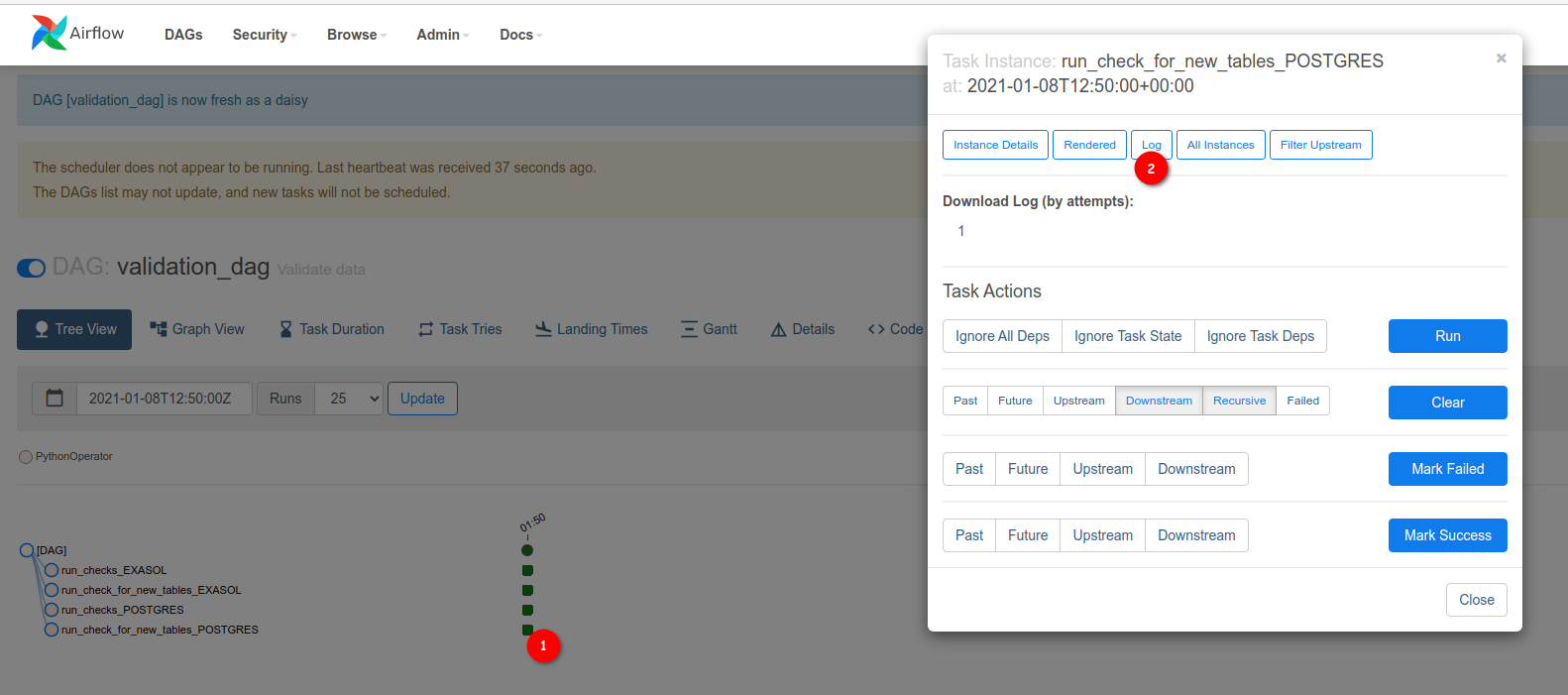Describe the bug
# I commented out this line
# profile: 're_data_postgres'
then I ran:
(.venv) daniel@dbrtly-MBP dbt_shop % dbt compile
Running with dbt=0.20.0
Found 26 models, 44 tests, 0 snapshots, 0 analyses, 647 macros, 0 operations, 0 seed files, 4 sources, 1 exposure
20:04:50 | Concurrency: 4 threads (target='dev')
20:04:50 |
Encountered an error:
Runtime Error
Runtime Error in model re_data_base_metrics (models/intermediate/re_data_base_metrics.sql)
404 Not found: Dataset daniel-bartley-sandbox:dbt_shop_re was not found in location US
(job ID: 69d805c5-c7e3-4bf0-9cdd-ee8357fd0d38)I manually created the dataset to see what would happen.
(.venv) daniel@dbrtly-MBP dbt_shop % dbt compile
Running with dbt=0.20.0
[WARNING]: Configuration paths exist in your dbt_project.yml file which do not apply to any resources.
There are 1 unused configuration paths:
- seeds
Found 26 models, 44 tests, 0 snapshots, 0 analyses, 647 macros, 0 operations, 0 seed files, 4 sources, 1 exposure
20:07:51 | Concurrency: 4 threads (target='dev')
20:07:51 |
Encountered an error:
Runtime Error
Runtime Error in model re_data_freshness_inc (models/intermediate/re_data_freshness_inc.sql)
404 Not found: Table daniel-bartley-sandbox:dbt_shop_re.re_data_tables was not found in location US
(job ID: 62bf3af6-1656-4fb2-88d0-42166b550568)Expected behavior
This command should run with no errors related to the re_data package.
To Reproduce
Assuming you start with a functional project named jaffle_shop (1 source, 1 additional model) with python, a valid profile, permissions, etc. The following should run without an error:
cd jaffle_shop
{
echo 'packages:'
echo ' - package: re-data/re_data'
echo " version: ['>=0.2.0', '<0.3.0']"
} > packages.yml
dbt deps
dbt compileScreenshots
Not UI related
Logs and additional context
2021-08-02 10:07:52.639923 (Thread-2): Finished running node model.re_data.re_data_schema_changes
2021-08-02 10:07:52.640174 (Thread-1): Finished running node model.re_data.re_data_freshness_inc
2021-08-02 10:07:52.640377 (Thread-4): Finished running node model.re_data.re_data_base_metrics
2021-08-02 10:07:52.641022 (MainThread): Connection 'master' was properly closed.
2021-08-02 10:07:52.641607 (MainThread): Connection 'model.re_data.re_data_freshness_inc' was properly closed.
2021-08-02 10:07:52.641744 (MainThread): Connection 'model.re_data.re_data_schema_changes' was properly closed.
2021-08-02 10:07:52.641823 (MainThread): Connection 'model.dbt_shop.customer_orders' was properly closed.
2021-08-02 10:07:52.641893 (MainThread): Connection 'model.re_data.re_data_base_metrics' was properly closed.
2021-08-02 10:07:52.642121 (MainThread): Sending event: {'category': 'dbt', 'action': 'invocation', 'label': 'end', 'context': [<snowplow_tracker.self_describing_json.SelfDescribingJson object at 0x10b8f1f10>, <snowplow_tracker.self_describing_json.SelfDescribingJson object at 0x10b948f10>, <snowplow_tracker.self_describing_json.SelfDescribingJson object at 0x10bcd3a30>]}
2021-08-02 10:07:52.642348 (MainThread): Flushing usage events
2021-08-02 10:07:53.707659 (MainThread): Encountered an error:
2021-08-02 10:07:53.707887 (MainThread): Runtime Error
Runtime Error in model re_data_freshness_inc (models/intermediate/re_data_freshness_inc.sql)
404 Not found: Table daniel-bartley-sandbox:dbt_shop_re.re_data_tables was not found in location US
(job ID: 62bf3af6-1656-4fb2-88d0-42166b550568)
2021-08-02 10:07:53.710593 (MainThread): Traceback (most recent call last):
File "/Users/daniel/git/dbrtly/dbt_shop/.venv/lib/python3.9/site-packages/dbt/main.py", line 125, in main
results, succeeded = handle_and_check(args)
File "/Users/daniel/git/dbrtly/dbt_shop/.venv/lib/python3.9/site-packages/dbt/main.py", line 203, in handle_and_check
task, res = run_from_args(parsed)
File "/Users/daniel/git/dbrtly/dbt_shop/.venv/lib/python3.9/site-packages/dbt/main.py", line 256, in run_from_args
results = task.run()
File "/Users/daniel/git/dbrtly/dbt_shop/.venv/lib/python3.9/site-packages/dbt/task/runnable.py", line 425, in run
result = self.execute_with_hooks(selected_uids)
File "/Users/daniel/git/dbrtly/dbt_shop/.venv/lib/python3.9/site-packages/dbt/task/runnable.py", line 384, in execute_with_hooks
res = self.execute_nodes()
File "/Users/daniel/git/dbrtly/dbt_shop/.venv/lib/python3.9/site-packages/dbt/task/runnable.py", line 339, in execute_nodes
self.run_queue(pool)
File "/Users/daniel/git/dbrtly/dbt_shop/.venv/lib/python3.9/site-packages/dbt/task/runnable.py", line 246, in run_queue
self._raise_set_error()
File "/Users/daniel/git/dbrtly/dbt_shop/.venv/lib/python3.9/site-packages/dbt/task/runnable.py", line 222, in _raise_set_error
raise self._raise_next_tick
dbt.exceptions.RuntimeException: Runtime Error
Runtime Error in model re_data_freshness_inc (models/intermediate/re_data_freshness_inc.sql)
404 Not found: Table daniel-bartley-sandbox:dbt_shop_re.re_data_tables was not found in location US
(job ID: 62bf3af6-1656-4fb2-88d0-42166b550568)
2021-08-02 10:07:53.710829 (MainThread): unclosed running multiprocessing pool <multiprocessing.pool.ThreadPool state=RUN pool_size=4>






